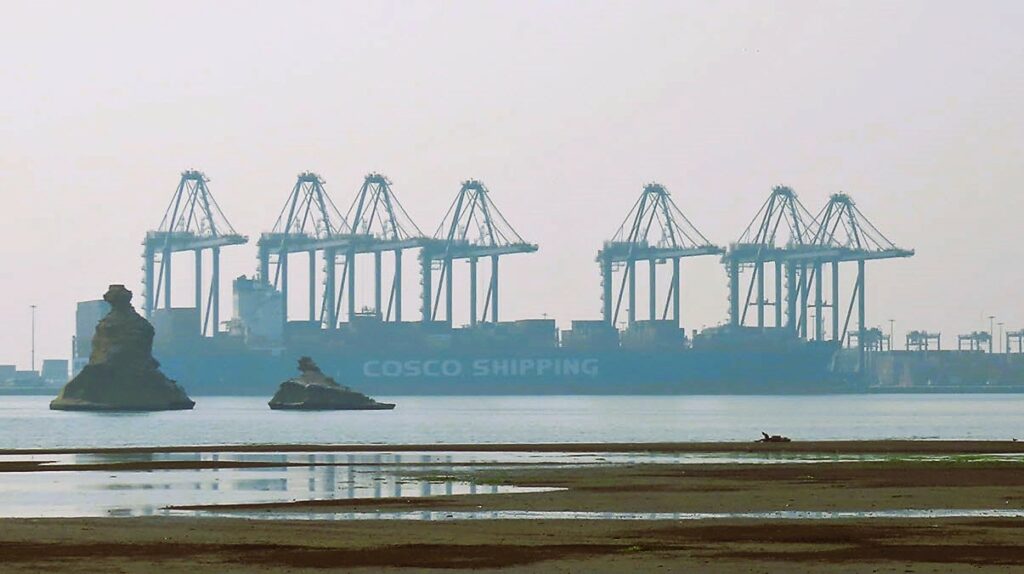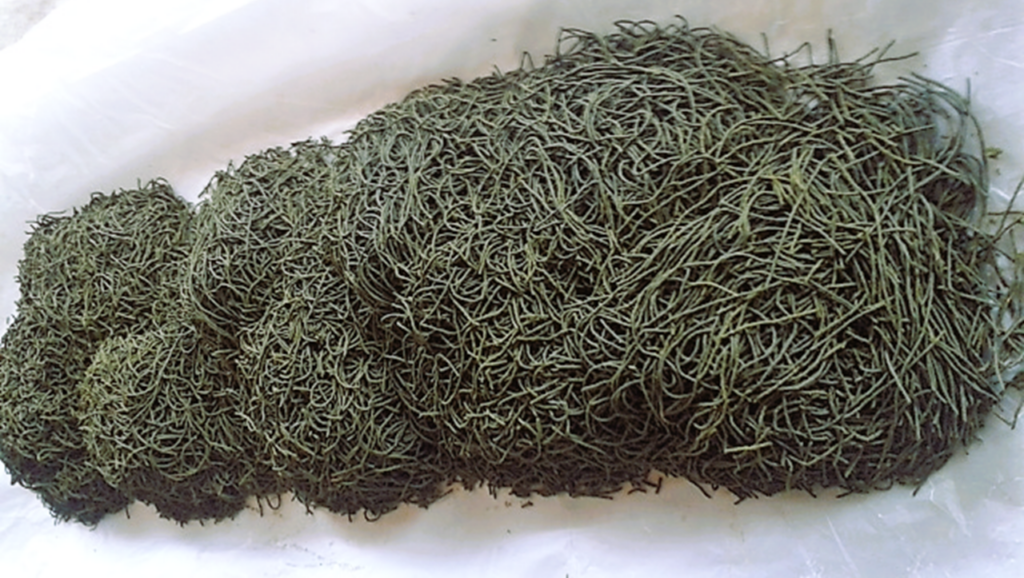
Tea News for the week ending March 3
| Pakistan Willing to Barter Rice for Kenyan Tea
| Asahi Launches SOU, its First New Tea Brand in Decades
| Tatcha Unveils Virtual Forest Bathing and Meditation Experience
| PLUS Tea Processing Reimagined: Extruded Tea
Hear the Headlines
Listen to Episode 106
Pakistan Offers to Barter Rice to Resolve Tea Import Impasse with Mombasa Tea Suppliers
Containers of tea from Africa have been piling up at the port of Karachi since December, with more on the way, but for the first time in months, ships are unloading at a brisk pace. The government needs $1 billion immediately and $8.5 billion to pay the country’s fuel bills.
Pakistan customs officials estimate that 95% of the 8,500 containers in port await letters of credit, including almost 5 million kilos of tea in 300 containers shipped from Africa.
The logjam is preventing billion of dollars worth of raw materials from reaching manufacturers. During the weekend of March 12, port authorities processed 1,024 inbound containers and 2,553 containers filled with long-delayed exports essential to offset a $48.4 billion trade deficit.
Honda, Suzuki, and Indus Motor assembly lines are closed or curtailed due to severe disruption to their supply chains. Shipping agents this week advised Pakistan that foreign shipping lines will halt services if the backlog is not resolved. DHL announced it would scale back operations, suspend imports, and limit outbound shipments.
Tea retail prices surged by Rs1000 to Rs1,600 per kilo leading to the celebration of Ramazan on March 22. Prices could go as high as Rs2,500 per kilo (about $9.50 per kilo), according to Zeeshan Maqsood, an executive member of the Pakistan Tea Association(PTA). Maqsood told the Dawn Newspaper that delays in processing bank documents lead to shortages and higher prices as retailers ration supplies.
Last year Pakistan purchased 234 million kilos of tea from Kenya. To resolve the impasse, Islamabad offered Kenya 150,000 metric tons of rice for tea of equivalent value. Mombasa traders welcomed the swap, according to East African Tea Trade Association (ETTA) Managing Director Edward Mudibo. He told Business Daily Africa, “We welcome this arrangement because it will work in our favor given the economic situation in Pakistan.”
Africa supplies 90% of Pakistan’s black tea imports, and Pakistan, in turn, supplies Afghanistan with 87% of its tea. In 2023 Pakistan’s tea market is expected to generate $1.12 billion, a 4.3% decline, according to Statista market research. Pakistan and Egypt buy 55% of Kenya’s tea exports annually, but sales have steeply declined since November, according to EATTA.
Pakistan is currently in talks with the International Monetary Fund (IMF) to unlock the next tranche of $1.1 billion of a $6.5 billion bailout agreed upon in 2019.

Asahi Launches First New Tea Brand in Decades
Beverage giant Asahi expects to sell 60 million bottles of SOU this year. The innovative Icho-style unsweetened partially fermented green tea launches on April 4.
Asahi surveyed 12,000 people over two years to discover that the taste preferences of Japanese consumers have changed from slightly bitter green tea to teas with “high aroma and crisp flavor.”
This is Japan writes that the country’s top tea master Yasuyuki Suda was commissioned to develop a “high aroma tea that meets the needs of the times,” writes the company. The tea will be available in 620ml and 2-liter PET bottles developed exclusively for Asahi.
According to the International Tea Committee, Japan is the eighth-largest tea-consuming country in the world. Green tea accounts for 15% of sales volume. It is also a popular export. Leading brands include Kirin, Suntory, and Ito En. In 2021 the export value of Japanese tea reached more than 20 billion yen, doubling since 2015. The top destination was the U.S., accounting for half the total.
Asahi is known for its international beer brand but also owns Mitsuya, a traditional steamed tea brand that dates to 1884, and Wonda, an RTD tea launched in 1991. Wonda’s product range includes black, green, and oolong teas, bottled coffee, and fruit blends.
Asahi Holdings earned $25.1 billion in the fiscal year ending January.
BIZ INSIGHT – Japanese consumers drink more bottled tea than all carbonated beverages combined. Kirin developed the world’s first canned tea in the 1960s. Kirin Namacha, a heat-treated green tea, was sold in small, 150ml cans that became a staple in Japan’s vending machines by the 1970s. Bottled teas were first introduced in the US in the 1980s by Lipton and Nestea and are now the top-selling format in Japan.

Tatcha Unveils Virtual Forest Bathing and Meditation Experience
The Japanese company, with offices in San Francisco, Hong Kong, and the UK, currently hosts an online meditation set in a virtual cypress forest.
Touring the virtual store provides insights into “shinrin-yoku,” the ritual of connecting to nature through the senses. The destination is an onsen wellness resort with a ceremonial tearoom, hot tub, and meditation led by Toryo Ito, a Japanese Zen Buddhist monk and brand ambassador.
Last week the metaverse forest came to life as a three-day Los Angeles pop-up that introduced visitors to forest bathing in a setting that resembled a Japanese Hinoki Forest. The occasion was launching of Tatcha’s Forest Awakening skincare collection at Sephora.
Online visitors are introduced to the body wash and skincare products in a natural setting enhanced by the simulated forest with sounds of running hot springs and varying shade as they “walk” about the forest and spa.
Olga Dogadkina, co-founder and CEO at Emperia, the software company that created the metaverse experience, told Chain Store Age, “Virtual stores are becoming an extension of the brand, one that allows retailers to tell a story as no other media could.”
Tatcha offered a line of green tea-based cosmetics and developed a “Renewal Tea” blend of Japanese Pine and Mulberry created by Japanese blender Hagugendo tea to accompany the campaign. The tea sells for $14 for 20g in 8 tea bags.




International Taste Institute Awards Two Starts to Mount Everest Fruit Tea Blend
Brussels Judges Present “Berry Gang” a Superior Taste Award – the equivalent of two Michelin Stars
Kirchner, Fischer & Co. Managing Director Stefan Gieschke said the winning tea was blind-tasted by 200 well-known chefs and sommelier judges who evaluated hundreds of teas for color, brilliance, fragrance, complexity, character, mouthfeel and finish, among other criteria.
“We always knew that our teas are top class! That’s how self-confident we are with 230 years of company history,” said Gieschke. “Now we have it written in black on white or better, yet — gold on white!
The Institute’s expertise is recognized worldwide, and it has been tasting, judging, and evaluating food and beverages from more than 130 countries for over 20 years.
Download the award
Since 1793 excellence was a matter of fact as we face the most critical jury in the world: our customers — but now also the jury of the International Taste Institute agrees,” he said.
“We are beyond proud of this amazing result and dedicate a lot of applause and a double page of attention in our catalog,” said Gieschke.

FEATURES
Adaptable Extruded Tea
Narendranath Dharmaraj, a 40-year tea industry veteran in Kerala, India, has developed an economical technique that rids tea of its stringy fiber skeleton resulting in a substrate superior to fannings and dust. Extruded tea is a malleable hybrid format that retains the fragrance of well-made, orthodox tea. The adaptable substrate can be blended to improve conventional CTC or pressed and die-cut to resemble broken-leaf grades. Imagine 3D-printed tea in myriad shapes and sold at a premium.

Tea Manufacture: Futuristic Development Opportunities
By Narendranath Dharmaraj
Not much has changed in tea manufacturing in this traditional and tradition-bound industry. Orthodox, as it means, is the original production method of tea with a typically twisted leaf appearance and liquor characteristics delivering flavor and aroma. Such teas are best brewed by steeping in boiled water for a few minutes and typically yield fewer cups per unit weight of tea, described as ‘cuppage.’ Normally the withering is hard, meaning more moisture is removed from the leaf. The withered leaf is subjected to gentle and limited maceration in gently rotating rollers to express just enough juice to impart the aroma and flavor over longer periods of ‘fermentation.’ The target is to maximize the whole leaf and rolled nutty leaf grades which typically result from a combination of finer green leaf quality and careful adherence to manufacturing parameters (many of the ‘specialty teas’ are in these grades). Read more…
Share this episode with your friends in tea.
Signup to receive Tea Biz weekly in your inbox.

